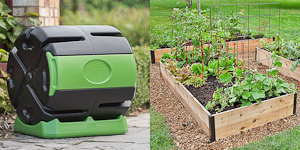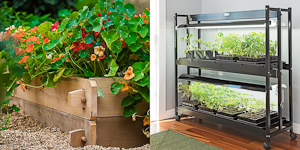- Home
- Growing Carrots
- Storing Carrots
Storing Carrots
Why a whole article on storing carrots? Because vegetable gardening expertise doesn’t help if you lose your harvest due to improper storage. I myself have grown a lovely crop of carrots that should have lasted me through the better part of winter, but ended up rotting because I didn’t store them properly.
Number one rule: store only perfect, undamaged carrots. Eat
the weird or damaged ones fresh.
I like to grow multiple, sequential plantings of carrots so
that I have plenty to eat fresh throughout the growing season, plus have a
large final crop to store over the winter.
I plant the final crop for storage in mid-summer. To know exactly when to plant for your fall harvest, take the “days to maturity” date from the seed packet, and count backwards on your calendar from the first fall frost date in your region.
Who Knew? Storing Carrots in The Garden Itself
Unless you live in high latitudes (or altitudes) with severe,
prolonged subzero weather, in many US climates you can actually leave carrots
in the ground through the winter. This is an excellent solution if you have too
many carrots to store in the fridge and don’t have a cold root cellar.
This only works where the winters are cold enough to stop the
carrots from growing. If winters are very mild, carrots will keep trying to
grow beyond maturity, and will become woody and tough.
To “store” carrots in place in the garden over the winter you must mulch them deeply. A good foot or two of nice fluffy deciduous leaves works great. The leaves will pack down considerably over the winter, especially if you have a lot of snow, but they still make surprisingly good insulation.
You want to keep the ground from freezing, so you can dig down under the snow and leaves once a month or so to dig up part of a row. Make sure to mark where the row is, with deep enough stakes to be able to find it when the garden is under a blanket of snow.
Mid-winter harvest is a feel-good activity, that helps me make it through what sometimes feels like the bleakness of winter. (Of course, it’s only “bleak” if I forget to get outside and really see what is going on in nature.)
Storing Carrots in the Fridge
Carrots store the longest if kept at just above 32°F. and
about 95% humidity. Most refrigerators are warmer and drier than this, but
still do a fair job of storing carrots for 2-3 months if you prep the carrots
correctly and provide humidity to keep the carrots from drying out.
To prep carrots for longest fridge life, take care when harvesting to do the following:
- Brush off most of the soil, but do not wash the carrots. A bit of soil helps carrots resist decay
- Let the carrots dry for a few hours in the sun. No more than half a day, just enough to “seal” the skin
- Cut the tops off, close to the root
Make sure the carrots are dry, and then place them in a plastic bag with some holes punched in it. I put a slightly moistened paper towel in the bottom of the produce drawer, and then put the plastic bag with the carrots in there on top of it. The paper towel acts as a humidor. Keep an eye on the carrots in the bag to make sure that none of them get wet, or the whole batch can spoil in a hurry.
Storing Carrots in a Root Cellar
Not many people are blessed with a root cellar these days (wish I had one!), but if you are, you can store carrots for many months. Pack your carrots in slightly damp sand or sawdust in Rubbermaid tubs, plastic food buckets or other large containers.
Drill some holes in the lid for ventilation, and check the containers once in awhile to make sure that your carrots are okay. The closer you can come to just-above 32°F and 95% humidity, the longer your carrots will store, up to 6 months.
Do not store carrots near any fruits. Fruit gives off a ethylene oxide, a gas that speeds ripening of adjacent fruit. It will cause rotting of carrots and other root crops in storage.
Other Methods of Storing Carrots
Carrots can be:
- Canned
- Dehydrated
- Frozen
Of the above methods, freezing retains the most vitamins, but
requires continuous electricity to keep the freezer cold. Canning is a lot of
work and destroys some vitamins, but properly canned carrots stay good for several years and require no electricity.
Dehydrating works great, and the dried carrots will take a
lot less room than carrots preserved by other methods. Carrots are 88% water,
so dried carrots reduce in volume a lot. After dehydrating, you can run dried
carrots through a blender or grinder and make a powder that you can use to
thicken, flavor and “nutrify” soups and stews. You have to store the powder in airtight jars (ie, glass with metal lids, not plastic).
For detailed instructions on canning, freezing and drying all kinds of produce, visit your local state university extension service’s website. (Eventually I’ll cover it here, but there are other articles before it in queue.)
Read more about growing carrots in these related articles:
- Growing Carrots
All the basic facts you need to know about how to grow carrots. - Planting Carrots
Covers planting times, depth and spacing, and techniques to maximize use of space. Planting carrots differs depending on whether you grow in rows or beds. - Harvesting Carrots
Carrots must be harvested correctly in order to store well. Learn when to harvest, and how to harvest them without damage. - Carrot Diseases and Pests
The most common carrot diseases and pests, and how to prevent them in the organic vegetable garden.
Help share the skills and spread the joy
of organic, nutrient-dense vegetable gardening, and please...
~ Like us on Facebook ~
Thank you... and have fun in your garden!
Affiliate Disclaimer
This website contains affiliate links to a few quality products I can genuinely recommend. I am here to serve you, not to sell you, and I do not write reviews for income or recommend anything I would not use myself. If you make a purchase using an affiliate link here, I may earn a commission but this will not affect your price. My participation in these programs allows me to earn money that helps support this site. If you have comments, questions or concerns about the affiliate or advertising programs, please Contact Me.Contact Us Page
You Are Here: Vegetable Gardening Home > Growing Carrots > Storing Carrots



